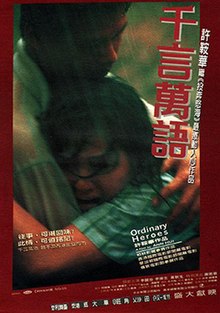Type a search term to find related articles by LIMS subject matter experts gathered from the most trusted and dynamic collaboration tools in the laboratory informatics industry.
| Ordinary Heroes | |||||||
|---|---|---|---|---|---|---|---|
 film poster | |||||||
| Chinese name | |||||||
| Traditional Chinese | 千言萬語 | ||||||
| Simplified Chinese | 千言万语 | ||||||
| Literal meaning | thousands of words | ||||||
| |||||||
| Directed by | Ann Hui | ||||||
| Written by | Chan King-chung | ||||||
| Produced by | Ann Hui | ||||||
| Starring | |||||||
| Cinematography | Yu Lik-wai | ||||||
| Edited by | Kwong Chi-leung | ||||||
| Music by |
| ||||||
Production company | Class Limited Productions | ||||||
Release date |
| ||||||
Running time | 128 minutes | ||||||
| Country | Hong Kong | ||||||
| Language | Cantonese | ||||||
Ordinary Heroes is a 1999 Hong Kong drama film directed and produced by Ann Hui. Based on real-life prototypes, the film focused on social activists in the 1970s and 1980s who fought defiantly against the British Colonial government for the rights of the Yau Ma Tei boat people and their mainland wives. Mostly leftists and Communist sympathisers, their despair after the 1989 Tiananmen Square massacre is also highlighted.
The Chinese title refers to a popular Teresa Teng song which played during the film. Ordinary Heroes was critically acclaimed, winning Best Picture at the 19th Hong Kong Film Awards and the 36th Golden Horse Awards in Taiwan, among others.
It won the prestigious Best Picture award at the 19th Hong Kong Film Awards, as well as five awards at the Golden Horse Film Festival, including Best Film. It was chosen as Hong Kong's official Best Foreign Language Film submission at the 72nd Academy Awards, but did not manage to receive a nomination.[1] It was also entered into the 49th Berlin International Film Festival.[2]